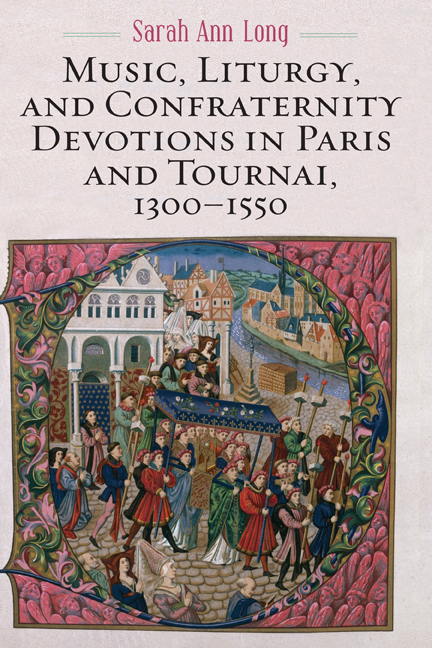Book contents
- Frontmatter
- Dedication
- Contents
- List of Illustrations
- Acknowledgments
- List of Abbreviations
- Editorial Procedures for Foreign Languages and Music Examples
- Note on Online Material
- Introduction
- 1 Confraternities and Popular Devotions to St. Barbara in Tournai
- 2 Relic Translation and Healing in Liturgies for St. Catherine and St. Nicholas in Paris
- 3 Historical Narratives and the Importance of Place in Masses for St. Sebastian
- 4 Compositional Practice, Networks, and the Dissemination of the Mass Ordinary in Confraternity Sources
- 5 The Role of the Parisian Book Production Community in the Perpetuation of Popular Devotions
- Conclusion
- Appendix 1 Sources
- Appendix 2 Inventories of Sources from Tournai
- Appendix 3 Scribal Hands and Gatherings in the Tournai Notary Confraternity Manuscripts
- Notes
- Bibliography
- Index of Chant and Polyphonic Compositions
- Index of Early Printed Liturgical Books
- Index of Manuscripts
- General Index
- Frontmatter
- Dedication
- Contents
- List of Illustrations
- Acknowledgments
- List of Abbreviations
- Editorial Procedures for Foreign Languages and Music Examples
- Note on Online Material
- Introduction
- 1 Confraternities and Popular Devotions to St. Barbara in Tournai
- 2 Relic Translation and Healing in Liturgies for St. Catherine and St. Nicholas in Paris
- 3 Historical Narratives and the Importance of Place in Masses for St. Sebastian
- 4 Compositional Practice, Networks, and the Dissemination of the Mass Ordinary in Confraternity Sources
- 5 The Role of the Parisian Book Production Community in the Perpetuation of Popular Devotions
- Conclusion
- Appendix 1 Sources
- Appendix 2 Inventories of Sources from Tournai
- Appendix 3 Scribal Hands and Gatherings in the Tournai Notary Confraternity Manuscripts
- Notes
- Bibliography
- Index of Chant and Polyphonic Compositions
- Index of Early Printed Liturgical Books
- Index of Manuscripts
- General Index
Summary
Sickness ceases, pestilence ceases when the altar has been built. Holy martyr, witness of Christ, beseech God for us, that the epidemic which is scourging our native land might cease, and that the will of God might hasten with mercy, and that when the misery of this perishing world is finished, we might be with you in glory: let every one of us say Amen.
This sequence text, which first appeared at the end of a fifteenth-century notated missal used in Paris, is a plea to St. Sebastian. Although the saint is not mentioned by name, it is one of several similar texts set to music that appear in manuscripts containing votive masses for him. It is a personal, direct appeal for the saint to intervene and protect his supplicants from one of the most devastating illnesses to affect Western Europe in the Middle Ages: the bubonic plague. The medieval laity believed that such settings served as vehicles to carry their words directly to these protective figures, and through them to God.
Plague epidemics affected everyone, forcing men and women of all walks of life to come face to face with their mortality. The disease first appeared in Western Europe in 1347, recurring every ten to fifteen years until well into the eighteenth century, and had a profound effect on the populace. For instance, before 1433, the city of Paris had a population of approximately two hundred fifty thousand people, but between 1433 and 1444, a mere decade, the plague took the lives of over forty-eight thousand Parisians. This is a rather large figure for a late-medieval urban population. One can imagine a certain helplessness that people felt when confronted with this disease, causing them to routinely seek divine intervention from patron saints thought to have special protective powers.
St. Sebastian was viewed as one of the most powerful protectors from the plague in northern France from the fourteenth through the sixteenth centuries, but he was not alone. He was one of a group of saints called the fourteen holy helpers, who were commonly invoked for protection against sickness and death in the region. St. Barbara, St. Nicholas of Myra, and St. Catherine of Alexandria were all thought to protect one against an untimely death, as was the Virgin Mary
- Type
- Chapter
- Information
- Publisher: Boydell & BrewerPrint publication year: 2021



